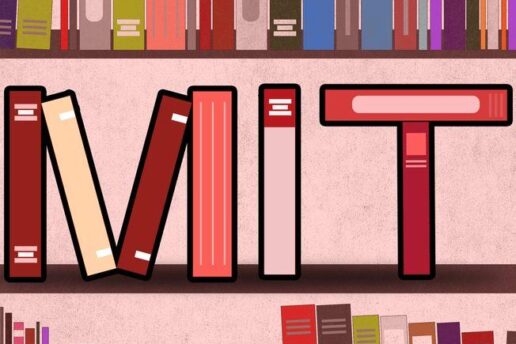
Seager, Chakraborty, Kaiser, and Wilczek featured in Summer 2021 recommended reading from MIT
Enjoy these recent titles from Institute faculty and staff.
As we enter the heart of summer, many of us will find ourselves with added time for relaxation and deep reading. The following titles represent a selection of recent offerings from MIT faculty and staff. Happy reading!
Novel, Biography, and Memoir
“The Planet After Geoengineering” (Actar, 2021)
By Rania Ghosn, associate professor of architecture
This graphic novel makes climate engineering and its controversies visible in five stories assembled from the deep underground to outer space. Each “geo-story” — Petrified Carbon, Arctic Albedo, Sky River, Sulfur Storm, and Dust Cloud — depicts possible future Earths that we come to inhabit on the heels of a geoengineering intervention.
“Camino Road” (Primary Information, 2021)
By Renée Green, professor of architecture
Green’s debut novel is an homage to (and parody of) the historically male-dominated genre of the road novel. Set between the late 1970s and early 1980s, and combining the genres of road novel, countercultural memoir, travel journal, epistolary novel, and screenplay, it is the record of the mind of a young woman coming of age as an artist, traveling in Mexico, and exploring the bohemian milieu of 1980s New York.
“The Smallest Lights in the Universe: A Memoir” (Crown, 2020)
By Sara Seager, the Class of 1941 Professor of Planetary Sciences and professor of Earth, atmospheric and planetary Sciences; physics; and aeronautics and astronautics
A pioneering planetary scientist, Seager searches for exoplanets — especially that distant, elusive world that sustains life. But with the unexpected death of her husband, the purpose of her own life becomes hard for her to see. As she struggles to navigate life after loss, Seager takes solace in the alien beauty of exoplanets and the technical challenges of exploration.
“The Empathy Diaries: A Memoir” (Penguin, 2021)
By Sherry Turkle, the Abby Rockefeller Mauzé Professor of the Social Studies of Science and Technology in the MIT Program in Science, Technology, and Society
In this vivid narrative, Turkle ties together her coming of age and her pathbreaking research on technology, empathy, and ethics. Growing up in postwar Brooklyn, Turkle searched for clues to her identity in a house filled with mysteries. Before empathy became a way to find connection, it was her strategy for survival.
Science and Medicine
“Viruses, Pandemics, and Immunity” (MIT Press, 2021)
By Arup Chakraborty, Institute Professor and professor of chemical engineering, chemistry, and physics; and Andrey Shaw
This book provides an accessible explanation of how viruses emerge to cause pandemics, how our immune system combats them, and how diagnostic tests, vaccines, and antiviral therapies work — concepts that provide the foundation for our public health policies.
“Quantum Legacies: Dispatches from an Uncertain World” (University of Chicago Press, 2020)
By David Kaiser, the Germeshausen Professor of the History of Science in the MIT Program in Science, Technology, and Society; professor of physics, and associate dean of social and ethical responsibilities of computing in the MIT Schwarzman College of Computing
Kaiser introduces readers to iconic episodes in physicists’ still-unfolding quest to understand space, time, and matter. He explores moments of discovery and debate among the minds of Albert Einstein, Erwin Schrödinger, Stephen Hawking, and many more who have indelibly shaped our understanding of nature as they’ve tried to make sense of a messy world.
“Probable Impossibilities: Musings on Beginnings and Endings” (Pantheon, 2021)
By Alan Lightman, professor of the practice of the humanities in MIT Comparative Media Studies/Writing
From the acclaimed author of “Einstein’s Dreams” comes a collection of meditative essays on the possibilities — and impossibilities — of nothingness and infinity, and how our place in the cosmos falls somewhere in between.
“Mercury Stories: Understanding Sustainability through a Volatile Element” (MIT Press, 2020)
By Noelle E. Selin, associate professor in the MIT Institute for Data, Systems, and Society and the Department of Earth, Atmospheric and Planetary Sciences; and Henrik Selin
This book explores how people have made beneficial use of mercury for thousands of years, how they’ve been harmed by its toxic properties, and how they’ve tried to protect themselves and the environment from its damaging effects. The authors develop and apply an analytical framework that can inform other efforts to evaluate and promote sustainability.
“Fundamentals: Ten Keys to Reality” (Penguin, 2021)
By Frank Wilczek, the Herman Feshbach Professor of Physics
Wilczek offers a simple yet profound exploration of reality based on the deep revelations of modern science. With clarity and joy, he guides readers through the essential concepts that form our understanding of what the world is and how it works. Through these pages, we come to see our reality in a new way — bigger, fuller, and stranger than it looked before.
Culture, Humanities, and Social Sciences
“Misogynoir Transformed: Black Women’s Digital Resistance” (NYU Press, 2021)
By Moya Bailey, MLK Visiting Professor in the MIT Program in Women’s and Gender Studies
When Bailey first coined the term “misogynoir,” she defined it as the ways anti-Black and misogynistic representation shape broader ideas about Black women, particularly in visual culture and digital spaces. In this book, Bailey shows how Black women actively reimagine the world by engaging in powerful forms of digital resistance at a time when anti-Black misogyny is thriving.
“Combating Inequality: Rethinking Government’s Role” (MIT Press, 2021)
Edited by Olivier Blanchard, professor emeritus of economics, and Dani Rodrik
Economic inequality is the defining issue of our time. In this book, leading economists, many of them current or former policymakers, bring good news: We have the tools to reverse the rise in inequality. In their discussions, they consider which of these tools are the most effective at doing so.
“Insurance Era: Risk, Governance, and the Privatization of Security in Postwar America” (University of Chicago Press, 2021)
By Caley Horan, associate professor of history
Horan shows that “the rise and dissemination of neoliberal values … were the result of a project to unsocialize risk, shrinking the state’s commitment to providing support.” This has had the effect of laying burdens on people who are often the least capable of bearing them.
“Just Money: Mission-Driven Banks and the Future of Finance” (MIT Press, 2021)
By Katrin Kaufer, director of Just Money at the MIT Community Innovators Lab (CoLab) in the Department of Urban Studies and Planning, and Lillian Steponaitis, CoLab research affiliate
In this book, Kaufer and Steponaitis take readers on a global tour of financial institutions that use finance as a force for good. In so doing, they remind us that money, if used intentionally and equitably, can be just money — a tool that serves nature, human development, and social justice.
“The Mental Life of Modernism: Why Poetry, Painting, and Music Changed at the Turn of the Twentieth Century” (MIT Press, 2020)
By Samuel Jay Keyser, professor emeritus of linguistics
Keyser argues that the stylistic innovations of Western modernism reflect not a cultural shift but a cognitive one. Behind modernism is the same cognitive phenomenon that led to the scientific revolution of the 17th century: the brain coming up against its natural limitations.
“Beyond 9/11: Homeland Security for the Twenty-First Century” (MIT Press, 2020)
Edited by Chappell Lawson, associate professor of political science; Alan Bersin; and Juliette N. Kayyem
What does it mean to “secure the homeland” in the 21st century? What lessons can be drawn from the first two decades of U.S. government efforts to do so? In this book, leading academic experts and former senior government officials address the most salient challenges of homeland security today.
“Money for Nothing: The Scientists, Fraudsters, and Corrupt Politicians Who Reinvented Money, Panicked a Nation, and Made The World Rich” (Random House, 2020)
By Thomas Levenson, professor of the practice in MIT Comparative Media Studies/Writing and director of the MIT Graduate Program in Science Writing
Advances of the Scientific Revolution created newly abstract ideas about money, transforming it from something material — discs of precious metal — to a mathematical notion of money, shares, or bonds, or insurance that could evolve over time. Levenson shows how we are still vulnerable to the same risks that brought down Britain’s first experiments with financial invention.
“States of Childhood: From the Junior Republic to the American Republic, 1895-1945” (MIT Press, 2020)
By Jennifer S. Light, the Bern Dibner Professor of the History of Science and Technology in the MIT Program in Science, Technology, and Society
Across the U.S. in the late 19th and early 20th century, simulated cities, states, and nations sprang up in which children played legislators, police officers, bankers, shopkeepers, and other adults. They passed laws, grew food, and constructed buildings, among other tasks, inside virtual worlds. Light examines these “junior republics” and argues that they marked the transition to a new kind of “sheltered” childhood for American youth.
“American Fascism” (Society for Cultural Anthropology, 2021)
Edited by Heather Paxson, the William R. Kenan, Jr. Professor of Anthropology, with Christopher Nelson and Brad Weiss
If the Jan. 6 attack on the U.S. Capitol represents a return of fascism, when was it here before? Is fascism an appropriate category to understand this moment? The essays within this anthology provide some context for our current political moment; they are provocations for the future, and for the anthropological work that lies ahead.
“Wall to Wall: Law as Culture in Latin America and Spain” (Vernon Press, 2021)
Co-edited by Ana Yáñez Rodríguez, lecturer in Spanish within MIT Global Languages
In this collection, a wide array of scholars based in the U.S., Spain, and Latin America explore the encounter of Hispanophone cultures and the law. Contributors delineate a fraught relationship of complicity, negotiation, and outright confrontation covering five centuries and a global landscape.
Technology and Society
“Redesigning AI: Work, Democracy, and Justice in the Age of Automation” (Boston Review, distributed by MIT Press, 2021)
Edited by Daron Acemoglu, Institute Professor and professor of economics
This book brings together experts — economists, legal scholars, policymakers, and developers — to explore the intersection of technology and economic justice, and to consider what steps tech companies can do take to ensure the advancement of AI does not further diminish economic prospects of the most vulnerable.
“The Hype Machine: How Social Media Disrupts Our Elections, Our Economy, and Our Health — and How We Must Adapt” (Currency, 2020)
By Sinan Aral, the David Austin Professor of Management and professor of information technology and marketing
Drawing on decades of research and business experience, Aral provides an insider’s tour of how social media affects our decision-making and shapes our world in ways both useful and dangerous, with critical insights into the social media trends of the 2020 election and beyond.
“The New Breed: What Our History with Animals Reveals about Our Future with Robots” (Macmillan, 2021)
By Kate Darling, researcher at the MIT Media Lab
Are robots going to replace us and take our jobs? While those discussions are going on in many industries, Darling offers a different take. She argues that by treating robots the same way we treat animals — with humanity — and incorporating them in our work, military, and family life, our future with robot technology looks bright.
“Data Feminism” (MIT Press, 2020)
By Catherine D’Ignazio, assistant professor of urban science and planning, and Lauren F. Klein
Data are neither neutral nor objective. While they have been used for good (exposing injustice, improving health outcomes), they have also been used to discriminate (granting home loans, determining jail sentences). The authors present a new way of thinking about data informed by intersectional feminism, and offer strategies for how data scientists can work toward a more just society.
“Recommendation Engines” (MIT Press, 2020)
By Michael Schrage, visiting scholar in MIT Sloan’s Initiative on the Digital Economy
Schrage explains the origins, technologies, business applications, and increasing societal impact of recommendation engines, the systems that allow companies worldwide to know what products, services, and experiences “you might also like.” Part of the MIT Press Essential Knowledge Series.
“What to Expect When You’re Expecting Robots: The Future of Human-Robot Collaboration” (Basic Books, 2020)
By Julie Shah, associate professor of aeronautics and astronautics and associate dean of social and ethical responsibilities of computing in the MIT Schwarzman College of Computing, and Laura Major SM ’05
A vision for how robots can survive in the real world and how they will change our relationship to technology. From teaching them manners, to robot-proofing public spaces, to planning for their mistakes, this book answers every question you didn’t know you needed to ask about the robots on the way.”
“Data Action: Using Data for Public Good” (MIT Press, 2020)
By Sarah Williams, associate professor of urban studies and planning
Data inevitably represent the ideologies of those who control their use; data analytics and algorithms too often exclude women, the poor, and ethnic groups. In this book, Williams provides a guide for working with data in more ethical and responsible ways.
Education, Work, Business, and Management
“Workforce Education: A New Roadmap” (MIT Press, 2021)
By William Bonvillian, senior director for special projects at MIT Open Learning, and Sanjay Sarma, vice president for open learning
Bonvillian and Sarma offer a roadmap for rebuilding America’s working class. They argue that we need to train more workers more quickly, and they describe innovative methods of workforce education that are being developed across the country.
“Step Up, Step Back: How to Really Deliver Strategic Change in Your Organization” (Bloomsbury, 2020)
By Elsbeth Johnson, senior lecturer in the MIT Sloan School of Management
Johnson challenges some of our most fundamental beliefs about how to lead change — and about what we consider “leadership.” She suggests leaders need to do more in early stages of the change, in specific ways and at specific times, and do less in later stages of the change.
“The New Enlightenment and the Fight to Free Knowledge” (Seven Stories Press, 2021)
By Peter B. Kaufman, project manager for resource development and strategic initiatives in MIT Open Learning
How do we create a universe of truthful and verifiable information, available to everyone? In this book, Kaufman describes the powerful forces that have purposely damaged our efforts to share knowledge widely and freely, drawing up a progressive agenda for how today’s free thinkers can band together to fight them — and win.
“Overload: How Good Jobs Went Bad and What We Can Do About It” (Princeton University Press, 2020)
By Erin L. Kelly, MIT Sloan Distinguished Professor of Work and Organization Studies, and Phyllis Moen
Years of research shows how organizational change and work redesign strategies can address burnout, overload, and turnover — especially timely as many professionals in the past year have been asked to do more with less in extremely challenging circumstances.
“Shaping the Future of Work: A Handbook for Action and a New Social Contract” (Routledge, 2020)
By Tom Kochan, the George Maverick Bunker Professor of Management, and Lee Dyer
This book provides a clear roadmap for the roles workers and leaders in business, labor, education, and government must play in building a new social contract for all to prosper. It is a call to action for a collaborative effort to develop both high-quality jobs and strong, successful businesses while overcoming the deep social and economic divisions that are all too apparent in society today.
“Remote, Inc.: How to Thrive at Work . . . Wherever You Are” (Harper Business, 2021)
By Robert Pozen, senior lecturer in the MIT Sloan School of Management, and Alexandra Samuel
You can thrive and excel when you’re working remotely, if you adopt the mindset, habits, and tech tools of professionals who are even more productive outside the office. Learn to think like a “business of one,” and that entrepreneurial mindset will transform your experience of remote work.
“Failure to Disrupt: Why Technology Alone Can’t Transform Education” (Harvard University Press, 2020)
By Justin Reich, associate professor of comparative media studies
Reich describes how learning technologies — even those that are free to access — often provide the greatest benefit to affluent students and do little to combat growing inequality in education. We still need new teaching tools, and classroom experimentation should be encouraged, he asserts. But successful reform efforts will focus on incremental improvements, not the next killer app.
“Grasp: The Science Transforming How We Learn” (Doubleday, 2020)
By Sanjay Sarma, vice president for open learning, and Luke Yoquinto, research associate in the MIT Center for Transportation and Logistics
Sarma and Yoquinto summarize the history of pedagogy and offer a vision for a different future, asking important questions about the efficacy of exams, the notion of innate ability, and new scholarship on how learners understand, absorb, and utilize information and skills. They argue for a more accessible, flexible, and engaging learning ecosystem.
“Make it Clear: Speak and Write to Persuade and Inform” (MIT Press, 2021)
By Patrick Henry Winston, former Ford Professor of Artificial Intelligence and Computer Science
Effective communication can be life-changing. This book from the late MIT professor and former director of the MIT Artificial Intelligence Laboratory helps readers understand how writing and speaking tools can help you get a job, make a sale, convince a boss, inspire a student, or even start a revolution.
Arts, Architecture, and Design
“Dance, Architecture and Engineering (Dance in Dialogue)” (Bloomsbury, 2021)
By Adesola Akinleye, research affiliate in the MIT Program in Art, Culture and Technology and a CAST Visiting Artist
Generated from a year of exchanges of movement ideas in cross-practice conversations and workshops with dancers, musicians, architects, and engineers, Akinleye engages with dance’s offer of perspectives on being in place. Themes addressed include how dance and city-making cultures engage with female bodies and non-white bodies in today’s era of #MeToo and #BlackLivesMatter.
“Architecture of Coexistence: Building Pluralism” (Architangle, 2020)
Edited by Azra Aksamija, associate professor of architecture
This book investigates how architecture can shape an open-minded and inclusive society, highlighting three internationally renowned projects: the White Mosque in Visoko, Bosnia-Herzegovina (1980); the Islamic Cemetery in Altach, Austria (2012); and Superkilen park in Copenhagen, Denmark (2011). Essays and interviews provide intriguing insights into architecture’s ability to bridge cultural divides.
“The Cannibal’s Cookbook: Mining Myths of Cyclopean Constructions” (ORO Editions, 2021)
By Brandon Clifford, associate professor of architecture
Bridging the realities of our ancestors and ourselves, this book proposes a series of architectural “recipes” after dining on a body of past expertise. Recipes are deciphered from ancient cyclopean masonry systems, but with a contemporary twist; they cannibalize leftover debris — building rubble that typically stuffs our landfills — to construct new buildings.
“Design Justice: Community-Led Practices to Build the Worlds We Need” (MIT Press, 2020)
By Sasha Costanza-Chock, associate professor of civic media
“Design justice” is an approach to design that is led by marginalized communities and that aims to challenge, rather than reproduce, structural inequalities. This book documents a multitude of real-world community-led design practices and connects design to larger struggles for collective liberation and ecological survival.
“The World as an Architectural Project” (MIT Press, 2020)
By Hashim Sarkis, dean of the School of Architecture and Planning (SA+P) and Roi Salgueiro Barrio, lecturer in SA+P, with Gabriel Kozlowski, researcher in SA+P
The world’s growing vulnerability to planet-sized risks invites action on a global scale. This book shows how, for more than a century, architects have imagined the future of the planet through world-scale projects. With 50 speculative projects by visionary architects documented in text and images, this ambitious and wide-ranging book is the first compilation of its kind.
“Things Fall Together: A Guide to the New Materials Revolution” (Princeton University Press, 2021)
By Skylar Tibbits, associate professor of architecture and co-director of the MIT Self-Assembly Lab
Today’s researchers are exploiting newly understood properties of matter to program materials that sense, adapt, and fall together instead of apart. This book describes how these materials open new directions for industrial innovation and challenge us to rethink the way we build and collaborate with our environment.
Cities and Planning
“A Blueprint for Coastal Adaptation: Uniting Design, Economics, and Policy” (Island Press, 2021)
Edited by Alan Berger, professor of urban studies and planning; Carolyn Kousky; and Billy Fleming
Coastal adaptation is necessary if communities are to adequately protect themselves from increased tidal flooding and sea level rise. Planning is critical to their survival. “A Blueprint for Coastal Adaptation” inspires innovative and cross-disciplinary thinking about coastal policy at the state and local levels while providing actionable, realistic policy and planning options for adaptation professionals and policymakers.
“Street Commerce: Creating Vibrant Urban Sidewalks” (University of Pennsylvania Press, 2020)
By Andres Sevtsuk, associate professor of urban studies and planning
Will e-commerce and big-box stores overtake the smaller-scale stores lining streets accessible on foot or by public transit? Sevtsuk offers a thoughtful analysis of the issues involved in implementing successful street commerce and provides examples from around the world where cities have reinvigorated their street commerce.
“Furthering Fair Housing: Prospects for Racial Justice in America’s Neighborhoods” (Temple University Press, 2021)
Edited by Justin P. Steil, associate professor of law and urban planning; Lawrence J. Vale, associate dean of the School of Architecture and Planning and the Ford Professor of Urban Design and Planning; Nicholas F. Kelly PhD ’21; and Maia S. Woluchem MCP ’19
The 2015 Affirmatively Furthering Fair Housing Rule was repealed by the Trump administration, jeopardizing the most significant federal effort to increase equal access to valuable opportunities such as top-performing schools and good jobs. By placing the history of fair housing in the context of the centuries-long struggle for racial equity, the authors show how the policy can be revived and enhanced to advance racial equity in America’s neighborhoods.
“Toward Urban Economic Vibrancy: Patterns and Practices in Asia’s New Cities” (SA+P Press, distributed by MIT Press, 2020)
Edited by Siqi Zheng, the Samuel Tak Lee Professor of Urban and Real Estate Sustainability, and Zhengzhen Tan, executive director of the MIT Sustainable Urbanization Lab
This book presents new cities in Asia from the perspective of economic vibrancy, identifying key mechanisms for measuring success. This analytical framework addresses the mechanisms along three dimensions: underlying forces that foster the dense and diverse production and consumption activities; creative financing; and the digitalization of urban systems.
For Young Readers
“Peculiar Produce: The Alphabet Book” (Hand Press Ink, 2021)
By Thomas Moya; illustrated by Arthur Grau, senior communications officer in the MIT Center for Transportation and Logistics
A picture book that teaches about uncommon foods and introduces readers to children’s names from different cultures. Using alliterative text and aspirational vocabulary to encourage discussion of body image and healthy eating, characters represent fruits and vegetables that highlight differences and imperfections.


